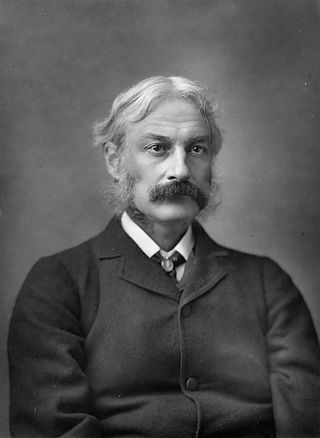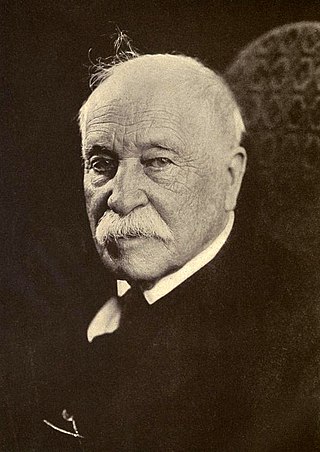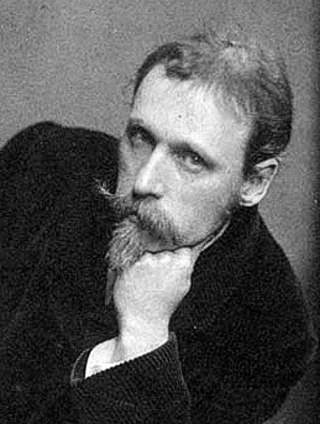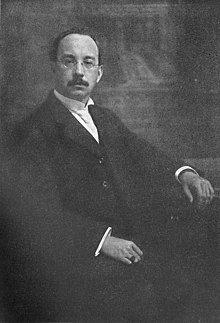
Aldous Leonard Huxley was an English writer and philosopher. He wrote nearly 50 books, both novels and non-fiction works, as well as wide-ranging essays, narratives, and poems.

Matthew Arnold was an English poet and cultural critic who worked as an inspector of schools. He was the son of Thomas Arnold, the celebrated headmaster of Rugby School, and brother to both Tom Arnold, literary professor, and William Delafield Arnold, novelist and colonial administrator. Matthew Arnold has been characterised as a sage writer, a type of writer who chastises and instructs the reader on contemporary social issues. He was also an inspector of schools for thirty-five years, and supported the concept of state-regulated secondary education.

Andrew Lang was a Scottish poet, novelist, literary critic, and contributor to the field of anthropology. He is best known as a collector of folk and fairy tales. The Andrew Lang lectures at the University of St Andrews are named after him.

Sir Edmund William Gosse was an English poet, author and critic. He was strictly brought up in a small Protestant sect, the Plymouth Brethren, but broke away sharply from that faith. His account of his childhood in the book Father and Son has been described as the first psychological biography.
Transcendentalism is a philosophical movement that developed in the late 1820s and 1830s in New England. A core belief is in the inherent goodness of people and nature, and while society and its institutions have corrupted the purity of the individual, people are at their best when truly "self-reliant" and independent. Transcendentalists saw divine experience inherent in the everyday, rather than believing in a distant heaven. Transcendentalists saw physical and spiritual phenomena as part of dynamic processes rather than discrete entities.

William Dean Howells was an American realist novelist, literary critic, and playwright, nicknamed "The Dean of American Letters". He was particularly known for his tenure as editor of The Atlantic Monthly, as well as for his own prolific writings, including the Christmas story "Christmas Every Day" and the novels The Rise of Silas Lapham and A Traveler from Altruria.

Stephen Jay Greenblatt is an American Shakespearean, literary historian, and author. He has served as the John Cogan University Professor of the Humanities at Harvard University since 2000. Greenblatt is the general editor of The Norton Shakespeare (2015) and the general editor and a contributor to The Norton Anthology of English Literature.

Walter Crane was an English artist and book illustrator. He is considered to be the most influential, and among the most prolific, children's book creators of his generation and, along with Randolph Caldecott and Kate Greenaway, one of the strongest contributors to the child's nursery motif that the genre of English children's illustrated literature would exhibit in its developmental stages in the later 19th century.

Arthur Christopher Benson, was an English essayist, poet and academic, and the 28th Master of Magdalene College, Cambridge. He wrote the lyrics of Edward Elgar’s Coronation Ode, including the words of the patriotic song "Land of Hope and Glory" (1902). His literary criticism, poems, and volumes of essays were highly regarded. He was also noted as an author of ghost stories.

William Vaughn Moody was an American dramatist and poet. Moody was author of The Great Divide, first presented under the title of The Sabine Woman at the Garrick Theatre in Chicago on April 12, 1906. His poetic dramas are The Masque of Judgment (1900), The Fire Bringer (1904), and The Death of Eve. His best-known poem is "An Ode In Time Of Hesitation," on the Spanish-American War; others include "Gloucester Moor," "On A Soldier Fallen In The Philippines," "The Brute," "Harmonics", "Until the Troubling of the Waters," "The Departure," "How The Mead-Slave Was Set Free," "The Daguerreotype," and "The Death of Eve." His poems everywhere bespeak the social conscience of the progressive era (1893-1916) in which he spent his foreshortened life. In style they evoke a mastery of the verse-craft of his time and also the reach and depth derived from his intensive studies of Milton and of Greek Tragedy.
The Irish Literary Revival was a flowering of Irish literary talent in the late 19th and early 20th century. It includes works of poetry, music, art, and literature.

John Kendrick Bangs was an American author, humorist, editor and satirist.

William Walker Atkinson was an attorney, merchant, publisher, and author, as well as an occultist and an American pioneer of the New Thought movement. He is the author of the pseudonymous works attributed to Theron Q. Dumont and Yogi Ramacharaka.

Sir John Frank Kermode, FBA was a British literary critic best known for his 1967 work The Sense of an Ending: Studies in the Theory of Fiction and for his extensive book-reviewing and editing.
Grove Press is an American publishing imprint that was founded in 1947. Imprints include: Black Cat, Evergreen, Venus Library, and Zebra. Barney Rosset purchased the company in 1951 and turned it into an alternative book press in the United States. He partnered with Richard Seaver to bring French literature to the United States. The Atlantic Monthly Press, under the aegis of its publisher, Morgan Entrekin, merged with Grove Press in 1991. Grove later became an imprint of the publisher Grove/Atlantic, Inc.
Nationality words link to articles with information on the nation's poetry or literature.

George Edgar Vincent was an American sociologist and university president.

Anne Charlotte Lynch Botta was an American poet, writer, teacher and socialite whose home was the central gathering place of the literary elite of her era.

Harold Bloom was an American literary critic and the Sterling Professor of Humanities at Yale University. In 2017, Bloom was described as "probably the most famous literary critic in the English-speaking world." Following the publication of his first book in 1959, Bloom wrote more than 50 books, including over 40 books of literary criticism, several books discussing religion, and a novel. During his lifetime, he edited hundreds of anthologies concerning numerous literary and philosophical figures for the Chelsea House publishing firm. Bloom's books have been translated into more than 40 languages. Bloom was elected to the American Philosophical Society in 1995.
Archer Taylor was one of America's "foremost specialists in American and European folklore", with a special interest in cultural history, literature, proverbs, riddles and bibliography.















